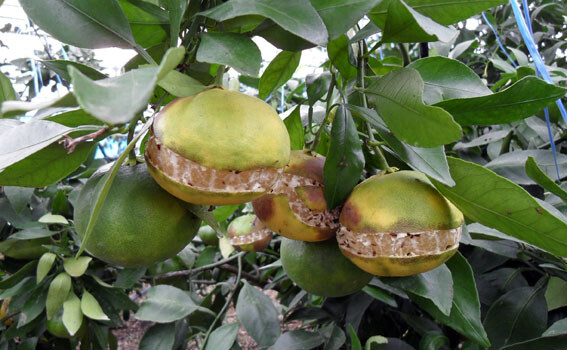
Jeju, South Korea – A recent study conducted by the Jeju Special Self-Governing Province Agricultural Technology Institute has revealed that high temperatures within greenhouses are the primary cause of a significant increase in citrus burst among Jeju's renowned red향 (Hallabong) oranges this year.
The institute reported that the incidence of citrus burst in Jeju's red향 crop has surged to 38.4% this year, marking a 12.7% increase compared to the previous year. While citrus burst is typically attributed to factors such as excessive fruit set, tree vigor, and soil moisture, the latest research indicates that greenhouse temperature is the most influential factor.
A data analysis of nine red향 farms participating in the big data collection project revealed that the average temperature within greenhouses during the growth period from May to September was 27.5 degrees Celsius, with a maximum of 30.8 degrees Celsius and a minimum of 23.8 degrees Celsius. These figures represent an increase of 1.2, 1.6, and 0.7 degrees Celsius, respectively, compared to the previous year. The data also showed a clear correlation between higher temperatures and a higher incidence of citrus burst.
Two farms that reported a lower incidence of citrus burst, at only 4.4%, maintained a lower average temperature of 26.7 degrees Celsius, with a maximum of 29.6 degrees Celsius and a minimum of 23.1 degrees Celsius.
Based on the findings, the institute has developed optimal temperature management guidelines for each stage of red향 growth, with a particular focus on the early growth stages of May and June.
Moving forward, the institute plans to apply these guidelines to greenhouses equipped with temperature control systems such as shading nets and fog systems to further analyze their impact on citrus burst. Additionally, the institute will provide real-time, customized growth and weather information to smart farm operators.
"Starting with temperature management, we plan to continuously develop optimal growth management models for red향, including soil moisture management and recommended fruit set," said an official from the Agricultural Technology Institute. "Once these models are established, they will significantly contribute to not only preventing citrus burst but also improving productivity and quality."
[Copyright (c) Global Economic Times. All Rights Reserved.]



























